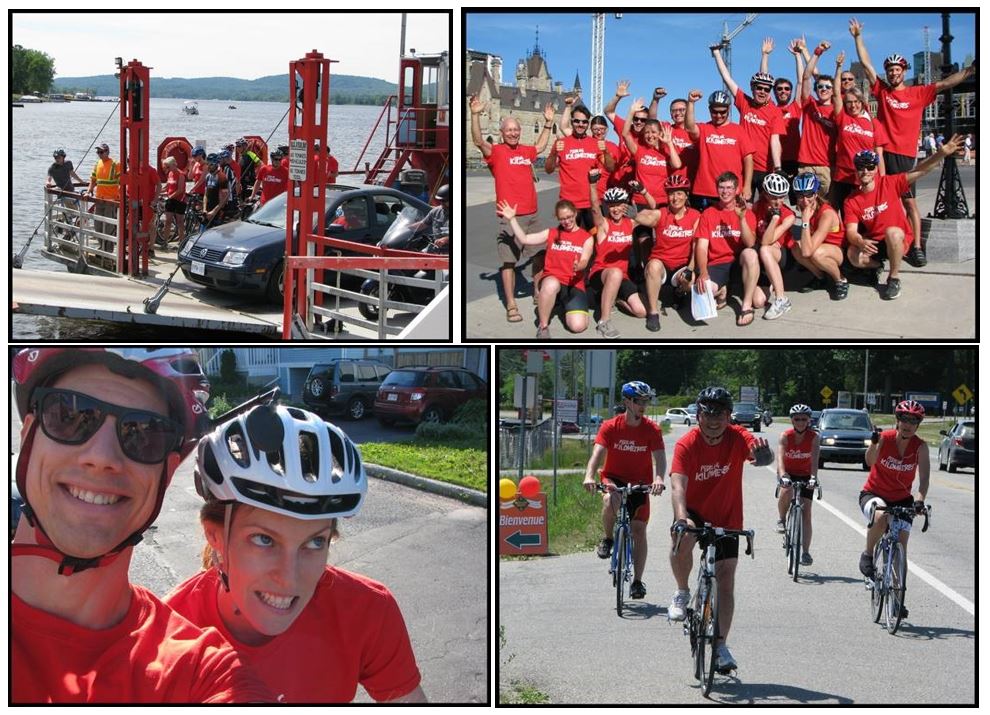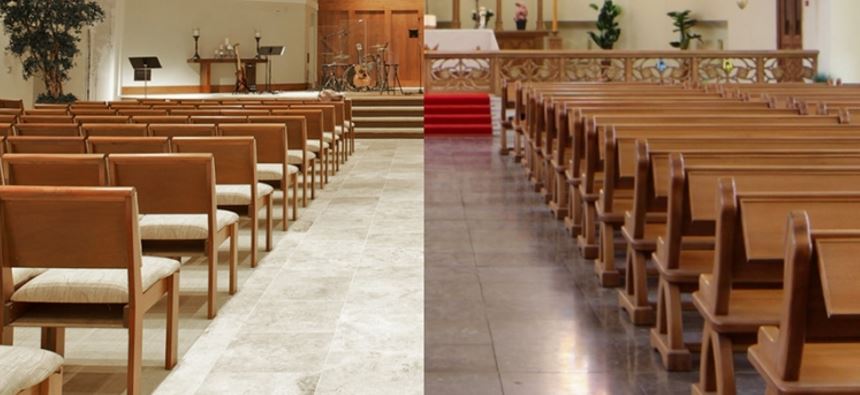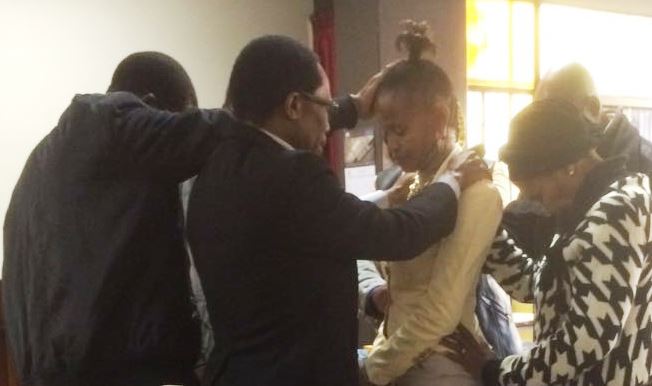Congratulations to GCI-USA Regional Pastor Rick Shallenberger and his wife Cheryl on the recent birth of their granddaughter Cora Leigh pictured below with (from left to right) Cora’s mom Kayla (Shallenberger) Elliott, Cora’s sister Olivia Grace, and Cora’s dad Chris Elliott.
Author: GCI Media
July Equipper
The June Equipper looked at stewardship with a focus on generosity. The recently published July Equipper continues the stewardship theme, now with a focus on the topic of fundraising. The five articles in the July issue are linked below.

- From Greg: Our calling to be fundraisers
Greg Williams shares from his personal experience important insights about our calling to raise funds in support of our churches and ministries. - Lessons learned from fundraising
Sam Butler shares what he and his church learned in raising funds for a ministry by which they reach out to the community with God’s love. - Fundraising through networking
Tim Sitterley shares what he has learned about networking as an effective tool in relationship building and fundraising. - Sermon summary: Be strong, willing and committed
Ted Johnston shares a sermon exploring lessons from Haggai related to our calling to share with Jesus in what he is doing to build his church. - Kid’s Korner: Summertime ministry
Susi Albrecht and Nancy Akers offer advice and resources for ministry to children during the summer vacation months.
Death of pastor’s mother-in-law
Thelma (Tracy) Davies, wife of Louis Davies (associate pastor of the GCI congregation in Long Beach, California) informed us that her mother Birdie Fay Tracy died on June 21. Many long-time members will remember the Tracy family, including Birdie’s husband Clifton, their three daughters (Thelma, Sandra Kay Plummer and Rozalyn) and a son Clifton. Birdie turned 83 on June 18 and would have celebrated 67 years of marriage on September 3. A graveside service is planned for July 13 at 11:00 AM at Rose Hills Cemetery (Garden of Valor) in Whittier, California.
Please pray for the Tracy and Davies families in their time of grief. Cards may be sent to:
Louis & Thelma Davies
10071 El Capitan Dr
Huntingtn Bch, CA 92646-6609
Riding to raise money
Several members of GCI in Canada recently participated in the 6th annual ride to raise money for Camp Connections, a GCI-Canada youth camp. Sixteen bicycle riders and two support-vehicle drivers raised $17,090 by traveling from Ottawa to Montreal. Leading the team for the 6th year in a row was Karl Moore who raised over $9,000. For months before the ride and then along the way, Karl promoted the trip on social media (see some of his pictures below). By doing so, Karl informed financial supporters and inspired other riders.
Retreat in Bogotá
On June 7-8 in Bogotá, Colombia, about 50 GCI members, including several pastors from Latin America, gathered for an Odyssey in Christ (OIC) retreat called “Experiencing the Presence of God in Life and in Ministry” (see the pictures below). Participants were led by OIC director Larry Hinkle in various spiritual formation exercises. There was much joy expressed for this opportunity to know more deeply the Triune God and one another. As a result of the retreat, 12 Latin American leaders committed to meeting every two weeks for a course in Trinitarian theology led by Hector and Paulina Barrero. During the course, Larry Hinkle will provide teaching on spiritual formation.
What about church growth?
Over the last few decades, much has been written about church growth. For some, the idea is repugnant—“growth” as associated with churches, is a dirty word. For some helpful perspective on the topic of church growth, click here for an e-church article titled, “Why is ‘growth’ a dirty word in the church?”
Ordination in South Africa
The tragedy of untruthfulness
Dear Brothers and Sisters,
 There are two little-known, rarely-observed holidays in the U.S. that address the issue of truthfulness: Honesty Day (April 30) and Tell the Truth Day (July 7). Has truth-telling become so rare that we need two holidays to get people thinking about this essential value? Though a lack of truthfulness is not exclusive to politicians, the current U.S. election cycle has brought forth a flurry of fact-checking activity calling into question the truthfulness of statements made by just about all of the presidential candidates. Sadly, honesty is no longer the norm in daily life, politicians included. I could cite many examples, but below are four statements—see if you can correctly match each with one of these four candidates: Rand Paul, Bernie Sanders, Hillary Clinton or Donald Trump. [1]
There are two little-known, rarely-observed holidays in the U.S. that address the issue of truthfulness: Honesty Day (April 30) and Tell the Truth Day (July 7). Has truth-telling become so rare that we need two holidays to get people thinking about this essential value? Though a lack of truthfulness is not exclusive to politicians, the current U.S. election cycle has brought forth a flurry of fact-checking activity calling into question the truthfulness of statements made by just about all of the presidential candidates. Sadly, honesty is no longer the norm in daily life, politicians included. I could cite many examples, but below are four statements—see if you can correctly match each with one of these four candidates: Rand Paul, Bernie Sanders, Hillary Clinton or Donald Trump. [1]
- “My mother named me after Sir Edmund Hillary after she read an article about his climbing Mount Everest.” (According to Snopes.com, Sir Edmond climbed Mt. Everest five years after this politician’s birth).
- “I received $1 million for a speech in 2005.” (According to various sources, this politician actually received $400,000).
- “Climate change is directly related to the growth of terrorism.” (According to Politifact.com this is an overstatement).
- “A man was put in prison for conspiracy just for having dirt on his land.” (According to FactCheck.org, the man was convicted of mail fraud, conspiracy and environmental violations for developing 67 mobile home lots inside federally protected wetlands without approval).
In providing these quotes, I’m not making political statements for or against any candidates. I refuse to do that, and it’s GCI policy that pastors not promote one candidate over another, or use their influence to sway members to vote one way or another. My point is that commitment to truth-telling is not the norm in our politics. Studies show that people expect politicians to lie. Dan Ariely, professor of psychology and behavioral economics at Duke University, put it this way:
People want their politicians to lie to them. The reason…is that people care about politics. [They] understand that Washington is a dirty place and that lying is actually very helpful to get policies implemented.
Though I care about politics, I do not want politicians to lie to me and I think it is tragic that politicians believe they can’t get anything done without lying. But enough about politics. My main point is this: over the last several years, we’ve been witnessing a growing tragedy of untruthfulness in which lying is becoming the norm. When one liar succeeds, others are tempted to follow. Even more tragically, when a lie remains in active play, it has a lingering effect even after it has been refuted. Think of someone who has been falsely accused—though they prove their innocence, the damage continues.
A long history of lies
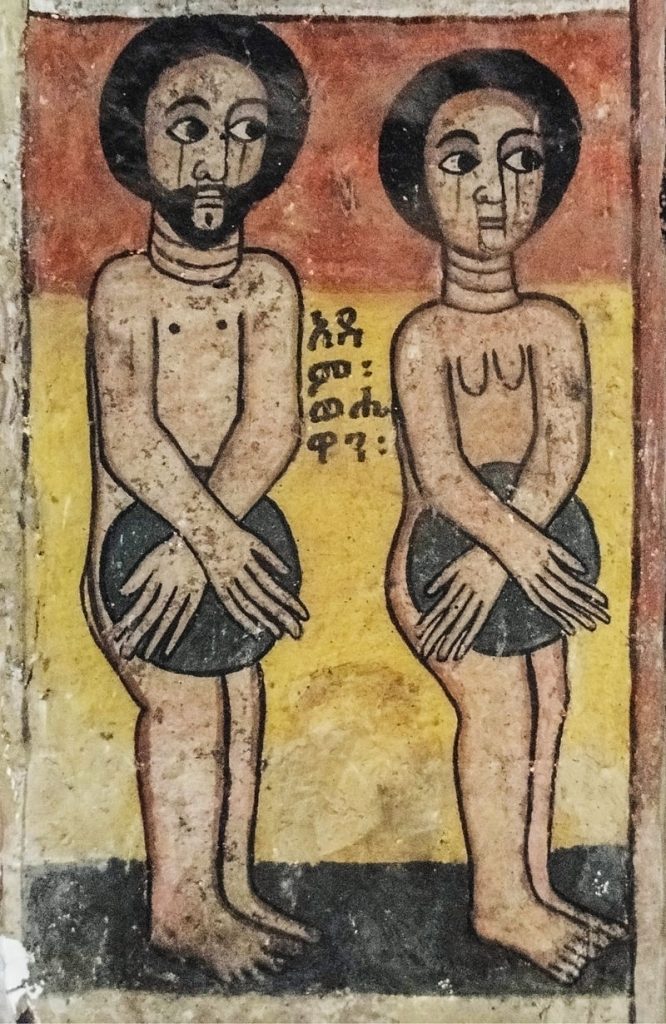
(from an Ethiopian church mural)
Public domain via Wikimedia Commons
Though it seems to be on the rise, lying is nothing new—it started with Adam and Eve in the Garden of Eden and has continued ever since. Harvard PhD and social scientist Bella DePaulo, who has been studying the psychology of deception for decades, summarizes some of her research in The Hows and Whys of Lies. She shows that people often do lie and examines their motivations. In one study, she put recorders on students for a week and found they lied, on average, in every third conversation of ten minutes or more. For adults, it was every fifth conversation. A few years later, Robert Feldman at the University of Massachusetts taped students in conversations with total strangers and got similar results. University of Toronto professor Kang Lee has done extensive research on children and lying. He set up an experiment in a video-monitored room and told children that a toy has been placed behind them, which they can have, but only if they do not peek. The adult then leaves the room and when they return a minute later asks the children if they peeked. At age 2, 30% lied; at 3, 50% lied; at age 5 or 6, 90% lied. Though Lee said he worries about the 10% who did not lie, I worry about a professor who has that worry!
Don’t believe everything you read
Though people tend to rely on scientists to tell the truth when making scientific claims, the facts indicate otherwise. According to Retraction Watch, retractions of scientific claims have increased 1900% in the last nine years. They also report that, in the first decade of the 21st century, “retractions of papers published by medical journals went up 19 fold, although the number of manuscripts being published only increased 44%.” Natural News reported that, according to the Committee on Publication Ethics, publication fraud occurs through fabrication, falsification and plagiarism. Most people (including most scientists), want to be honest, but if they live in a country where half-truths and bald-face lies are rampant, many begin to think, “Everybody cheats, so if I cheat here, then I guess that’s OK.” And so unfolds the tragedy of untruthfulness.
Believe (and follow) Jesus—he is the Truth
Lying, of course, is contrary to the way of Jesus, which is the way of truth. As Christians, we live in the truth of who Jesus is and of who we are in union with him. We value truth because we know who truth is—Jesus Christ! He says to us, “I am the way, the truth, and the life” (John 14:6 NKJV). These three dimensions of human existence are one in him and from him we receive all three. Take one away and the others collapse as well. While we cannot ourselves be the truth, in the light of who Jesus is we look for, live by, and depend upon all other truths relative to him. As followers of Jesus, we reject untruthfulness because it does not lead to participation in his life and love.
I thank God that many people are truth-tellers. But because untruthfulness abounds in our world, I long for the fullness of the kingdom when Jesus brings truth to bear in a renewed earth where all live in the truth of who they are in Christ (Isaiah 65:17; 2 Peter 3:13). At that time there will be no more tears—all will be healed and made whole. What an everlasting party that will be! And that, dear friends, is the truth!
Celebrating the truth that Jesus is and will always be,
Joseph Tkach
___________________
[1] Here is who made each campaign statement: (1) Hillary Clinton, (2) Donald Trump, (3) Bernie Sanders, (4) Rand Paul.
Day camp outreach in Cincinnati
As part of its outreach to the surrounding community, Christ Fellowship Church (a GCI congregation in the Cincinnati, Ohio, area) conducted on their property a three-day family festival followed by Westside Christian Camp—a week-long day camp serving 50 children. The congregation was assisted by young adults who came to Cincinnati from around the country. Led by Janet Morrison, these missionaries served under the banner of GC Trips, one of Generations Ministries’ multiple mission organizations.
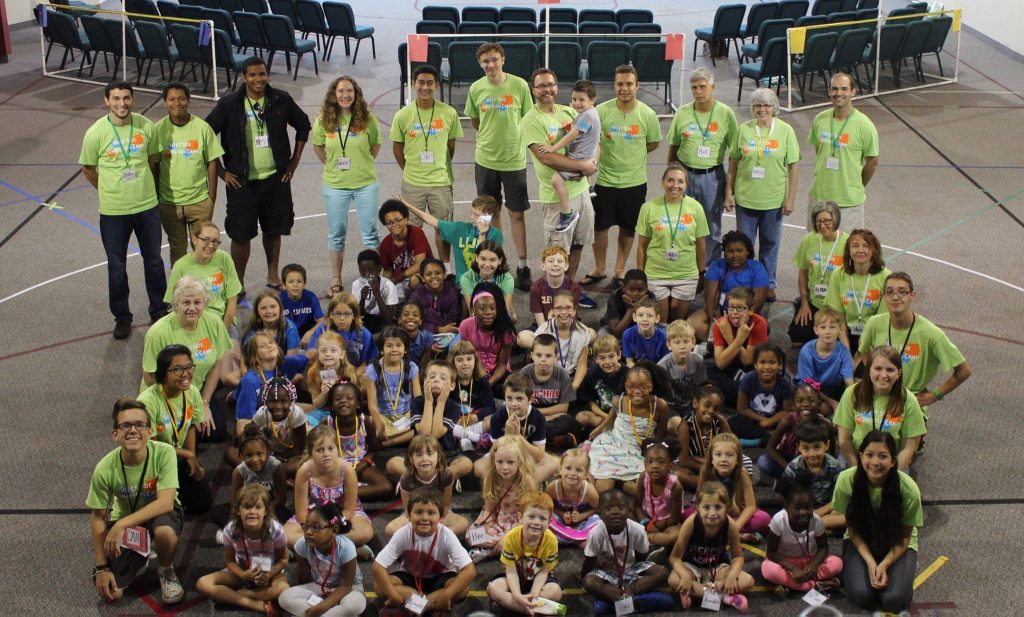
On Sunday following camp, Christ Fellowship Church hosted a worship celebration for campers and their parents. About 150 people attended (including 50 guests) and four were baptized. In reviewing these events, Anthony Mullins (GenMin national coordinator and camp participant) made this comment:
This was GenMin’s first attempt at this type of GCI church-camp partnership and I thought it was a smashing success! Now Christ Fellowship Church will continue the good work of discipling and serving their new members.
In the videos below, camp staffers share impressions of what they experienced while serving at Westside Christian Camp.
- Dustin Lampe, lead pastor at Christ Fellowship Church, notes how he saw the Lord at work and the impact the day camp had on parents and children, along with hopeful expectation of baptisms and families joining the life of the congregation.
On YouTube at https://youtu.be/b4s2ilp1iDs.
- Halie Carley talks about how she saw the gospel working in the hearts of the young children during the camp week. Halie attends the GCI church in Helena, Montana where she has volunteered many summers at SEP Montana.
On YouTube at https://youtu.be/hFUnJ4NbKHc.
- Chris Meade explains why he chose to invest two weeks of his busy summer on a GenMin mission trip and how it’s been to partner with a local GCI church to serve kids from their community.
On YouTube at https://youtu.be/zaWN6_nsuaA.
- Hazel Tabin talks about why she’s committed to serving as a domestic missionary with GC Trips.
On YouTube at https://youtu.be/hL8zXH4wB4Q.
For a report on this mission outreach from mission director Janet Morrison, click here.
Prayer matters
Dear Brothers and Sisters,
 I guess we’ve all experienced times of desperation when we cried out to God to intervene. Perhaps we prayed for a miracle, only to find that our prayer was seemingly to no avail when the miracle did not come. But I also guess most of us have experienced the joy of seeing the healing of a person we prayed for. I know a lady, who following prayer for her healing, had her missing rib grow back. The doctor told her, “Whatever you’re doing, keep doing it!” Many of us, I’m sure, have been comforted and encouraged knowing others are praying for us. I’m always encouraged when people tell me they’re praying for me. In reply I usually say “Thanks, I’ll take all the prayer I can receive!”
I guess we’ve all experienced times of desperation when we cried out to God to intervene. Perhaps we prayed for a miracle, only to find that our prayer was seemingly to no avail when the miracle did not come. But I also guess most of us have experienced the joy of seeing the healing of a person we prayed for. I know a lady, who following prayer for her healing, had her missing rib grow back. The doctor told her, “Whatever you’re doing, keep doing it!” Many of us, I’m sure, have been comforted and encouraged knowing others are praying for us. I’m always encouraged when people tell me they’re praying for me. In reply I usually say “Thanks, I’ll take all the prayer I can receive!”
A misguided approach
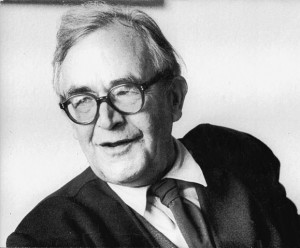
Whether our experiences with prayer have been negative or positive (and we’ve likely had both), it’s important to remember Karl Barth’s observation: “The most certain element of our prayer is not our requests, but what comes from God: His response” (Prayer, p. 66). But it’s easy to misinterpret God’s responses to our prayers when he does not answer the way we expected. It’s easy to fall prey to the mistake of viewing prayer as a mechanical process—treating God as if he was a cosmic vending machine where we submit our requests and he automatically gives us the desired “product.” This misguided approach, which is little more than an attempt to bribe God, often involves using prayer as a way to gain control of situations we’re powerless to control.
The purpose of prayer

Prayer isn’t about trying to get God to do something that he doesn’t want to do—it’s about joining God in what he is doing. Prayer isn’t about trying to control God—it’s about acknowledging that God has everything under his control. Barth explained it this way: “To clasp the hands in prayer is the beginning of our uprising against the disorder of the world.” In making this statement, he was acknowledging that we who are not of the world are, in prayer, joining God in his mission to the world. Rather than taking us out of the world (with all its disorder), prayer joins us to God and to his mission to save the world.
Because God loves the world, he sent his Son into the world, and when we pray with minds and hearts open to God’s will, we are placing our trust in the One who loves the world and loves us—the One who can see the end from the beginning and who can help us see that this present, mortal life is the beginning, not the conclusion. That sort of prayer helps us see that the world is not as God wants it, and it changes us so we can be agents of hope here and now in God’s present, unfolding kingdom.
When the opposite of what they pray for occurs, some people leap to the deistic conclusion that God is distant and uninvolved. Some even abandon belief in God altogether. Such was the case for Michael Shermer, founder of the Skeptic’s Society. He lost faith in God when his college sweetheart was severely injured in an automobile accident. With a broken back and paralysis from the waist down, she was permanently confined to a wheelchair. Michael believed that because she was a really good person, God should have answered prayers for her healing.
God is in control
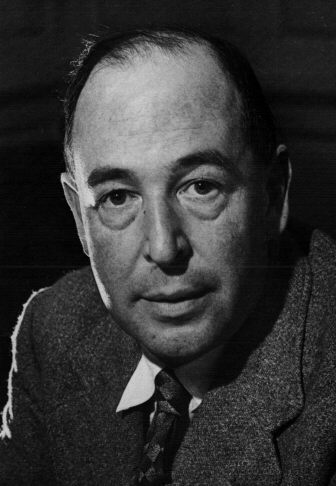
Rather than being a way to control God, prayer is humble acknowledgment that God is in control and we are not. In his book, God in the Dock, C.S. Lewis explained it this way:
Most of the events that go on in the universe are indeed out of our control, but not all. It is like a play in which the scene and the general outline of the story is fixed by the author, but certain minor details are left for the actors to improvise. It may be a mystery why He should have allowed us to cause real events at all, but it is no odder that He should allow us to cause them by praying than by any other method. [Christian philosopher Blaise] Pascal says that God “instituted prayer in order to allow His creatures the dignity of causality.” It would perhaps be truer to say that He invented both prayer and physical action for that purpose. He gave us small creatures the dignity of being able to contribute to the course of events in two different ways. He made the matter of the universe such that we can (in those limits) do things to it; that is why we can wash our own hands and feed or murder our fellow creatures. Similarly, He made His own plan or plot of history such that it admits a certain amount of free play and can be modified in response to our prayers. If it is foolish and impudent to ask for victory in war (on the ground that God might be expected to know best), it would be equally foolish and impudent to put on a [raincoat]—does not God know best whether you ought to be wet or dry?
Why pray?
Noting that God ordained prayer as a way for us to commune with him, Lewis explained in his book Miracles that God already has accounted for our prayers. The question then is this: Why pray? Lewis replies:
When we are praying about the result, say, of a battle or a medical consultation the thought will often cross our minds that (if only we knew it) the event is already decided one way or the other. I believe this to be no good reason for ceasing our prayers…. The event certainly has been decided—in a sense it was decided “before all worlds.” But one of the things taken into account in deciding it, and therefore one of the things that really cause it to happen, may be this very prayer that we are now offering.

Did you get that? God may be “answering” in response to a prayer he already knew you were going to pray. The ramifications of this are both thought-provoking and exciting. It tells us that our prayers are important; they matter. Lewis continues:
Though shocking as it may sound, I conclude that we can at noon become part causes of an event occurring at ten a.m. (Some scientists would find this easier than popular thought does.) The imagination will, no doubt, try to play all sorts of tricks on us at this point. It will ask, “Then if I stop praying can God go back and alter what has already happened?” No. The event has already happened and one of its causes has been the fact that you are asking such questions instead of praying. Thus something does really depend on my choice. My free act contributes to the cosmic shape. That contribution is made in eternity or “before all worlds”; but my consciousness of contributing reaches me at a particular point in the time-series.
Prayer matters
What Lewis is saying is that prayer matters—it always has and always will. Why? Because our prayers give us opportunity to join God in what he has done, is doing, and will do. Though we don’t understand all the ramifications of how science, God, prayer, physics, time and space, and things like quantum entanglement and quantum mechanics all work together, we know that God has determined such matters. Further, we know he has invited us to participate in what he is doing. Prayer is a big part of that participation.
As I pray, I often think of myself handing over or entrusting my prayers to God, knowing that, somehow, he will take and weave them into his good purposes, one way or another. I believe that God works together all things (including our prayers) for good in accordance with his glorious purposes. I’m also reminded that whenever we pray we are joining Jesus, our great High Priest, in his prayers of intercession. He takes our prayers, sanctifies them and shares them with the Father and the Holy Spirit. For that reason, I don’t believe there is ever an unanswered prayer. Our prayers join our Triune God in his will, purpose, and mission—much of which was determined before the foundation of the world.
While I can’t explain exactly why prayer matters, I trust God that it does. Therefore I’m encouraged when I hear that people are praying for me, and I hope you are encouraged knowing that I pray for you. I’m not doing so to try to control God, but to express my praise for the One who has all things under control.
Grateful that God is in control and that prayer matters,
Joseph Tkach
PS: For a previous Weekly Update letter on the practice of prayer, click here.



